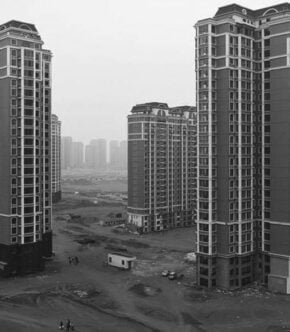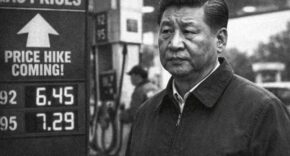In a bid to tackle the deepening crisis within its real estate sector, China is drawing inspiration from its socialist past, embracing state intervention as a key strategy to stabilize a market that has long been the domain of private developers. A report from the Wall Street Journal illuminates the Chinese government’s intent to reassert control over the crumbling property market, a move spearheaded by President Xi Jinping. This strategic pivot is not merely a response to the current downturn but a fundamental reevaluation of the role of real estate in China’s economy, aiming to mitigate the speculative excesses that have characterized the sector in recent history.
The Chinese property market, once a pillar of economic strength and a lucrative avenue for investment, is now fraught with challenges. A troubling cascade of falling home prices, developer bankruptcies, and a loss of confidence in real estate as a viable investment option has ushered in an era of economic uncertainty. This turmoil is not only stymieing domestic growth but also sending shockwaves through global financial markets. Amidst this backdrop, the Chinese Communist Party’s decision to leverage socialist methodologies to correct course is a testament to its broader agenda of tightening the reins on the private sector and consolidating economic control.
At the heart of the government’s strategy are two pivotal programs: the acquisition and conversion of distressed properties from the private market into government housing, and the construction of subsidized housing aimed at serving the needs of low- and middle-income families. The overarching ambition is to significantly elevate the proportion of state-built housing, targeting an increase from approximately 5% to a minimum of 30% of the national housing stock. This initiative aligns with President Xi’s broader vision of curbing the private sector’s dominance, an endeavor that has seen regulatory crackdowns on tech giants and bolstered investment in state-owned enterprises in strategic industries.
And this is the problem. Private entities in real estate will never have the confidence that their investments will remain in their own hands, or that failed investments by others will be available to the market to replay into a profitable situation. Private enterprise cannot compete in a market capriciously controlled by an inept government. Socialist methods are wasteful, unfair and economically destructive.
Economists and policy advisers involved in the formulation of this strategy have underscored its dual objectives: to temper the speculative fervor that has inflated the real estate bubble and to narrow the widening chasm between the affluent and the less fortunate, thereby advancing Xi’s “common prosperity” agenda. However, the financial implications of this endeavor are daunting, with estimates suggesting a potential expenditure of up to $1.4 trillion over the next five years. This raises pivotal questions about the government’s capacity to finance such an ambitious plan, especially against the backdrop of already significant debt levels among local governments.
Despite these challenges, the policy represents a significant ideological shift, harking back to an era when housing was predominantly under state control. During the Mao Zedong era, housing was largely provided by state-owned enterprises, a stark contrast to the liberalized market of recent decades, where private developers have played a dominant role. The shift towards private ownership has been instrumental in China’s economic ascent, fostering wealth creation but also engendering a debt-fueled bubble and exacerbating socio-economic disparities.
The government’s resolve to recalibrate the real estate sector’s role within the economy is evident in its efforts to stem the flow of credit into speculative activities and redirect resources towards the “real economy,” encompassing sectors deemed critical for China’s global competitiveness. However, the execution of this strategy is fraught with complexities, including the mammoth cost and the potential for further market distortions. Critics argue that the intervention could exacerbate issues of social fairness and fail to address the root causes of the crisis, such as demographic shifts and a supply glut that threatens to persist.
China’s turn towards socialist solutions for its property market crisis represents a fundamental rethinking of the sector’s role in the nation’s economy and society. While the intentions behind this strategy—to stabilize the market, ensure housing affordability, and promote social equity—are commendable, they will do more harm than good, costing hundreds of billions in tax dollars, and destroying any hope of a vibrant market.
Like every other major socialist measure, this too will fail.
https://www.wsj.com/world/china/china-real-estate-crisis-state-housing-656c5093











